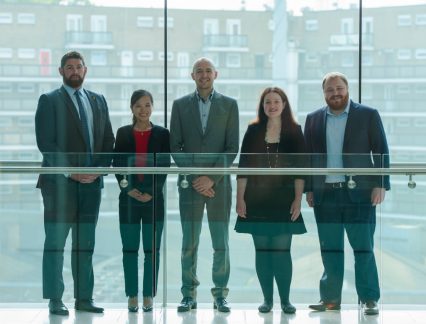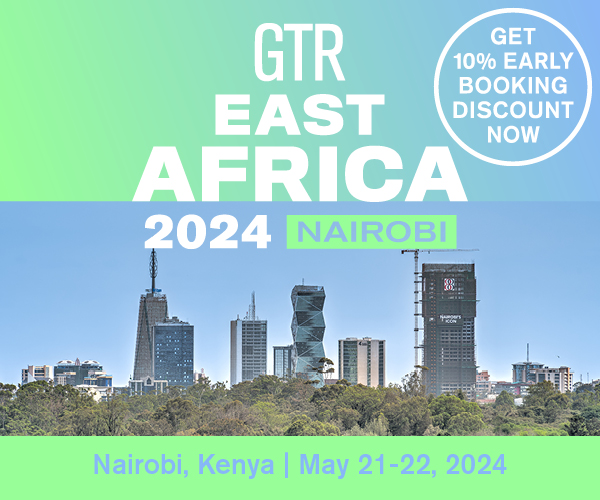
GTR gathered a group of next generation big thinkers to address the gaping generation and skills gap that currently exists in the world of trade and trade finance. What they found is that institutions can do better to specifically recruit young talent into trade finance. In these extracts of their conversation, they talk about what steps can be – and are being – taken to do so.
Discussion participants
- Natasha Condon, Western Europe trade sales head, Citi
- Zuan Ling Lim, AVP – supply chain management Asia Pacific, BNP Paribas
- David Sutter, head of platform, TradeIX
- Michael Walker, head of solution enablement, transaction banking, Finastra (chair)
- Sam West, relationship manager, soft commodities, FBN Bank (UK)
Many thanks to Finastra for hosting this discussion at its London office.
Walker: Looking at the demographic across the trade and supply chain finance industry, there is a big generation gap in the middle where there will soon be a huge leakage of knowledge and expertise, because so many people stay in trade finance for so long. The time is right to look to bridge that gap.
The aim of this discussion is to get some opinions around why you have stayed in trade and supply chain finance, and how you would look to attract and keep the next generation in the industry.
Zuan Ling, as somebody who has been in trade finance right from the very start of your career, what has been your thought process?
Lim: I did two internships during university in the cash management space. But when I graduated, there were no opportunities in this space, so I was offered a job in trade finance. It was completely new to me, and not something that is taught in school.
I was very fortunate to be with an institution that is very supportive of the younger generation and that promotes personal development and growth. That gave me a lot of opportunity to share my ideas, present my solutions, and also empower me in making decisions. What’s more, I was given opportunities to cover new geographies: I was moved to Australia to help develop the supply chain management business for one year, and this has kept me going.
I feel that to really retain young people, they need to be constantly energised. You need to give them avenues to present their ideas, empower them to make some decisions and give them opportunities to manage client interactions independently. I think all of this is very important so that they don’t get bored of the job, so that they are motivated to stay on, and so that they see opportunities to advance in the trade finance sector. This is what has kept me in the business for the past six years.
Walker: When I started out at Barclays, my first impression was that there was a lot of paper going around and it was not the leanest process I had ever seen. I think we would all agree that it is quite an antiquated process that has not changed for quite a long time. Do you see that changing? And is that change going to help people’s impressions of trade finance from the outside looking in?
Lim: I have seen some evolution in the trade finance space. There is a shift now to automated, paperless processing.
In the open account supply chain management space, where I am, I see a lot of platform providers very aggressively trying to get involved in the action but they do not have the funding capabilities, nor the structuring expertise that institutions like banks have. The trend we see now is more and more strategic partnerships between banks and fintech firms, to try to help clients streamline the whole trade finance process. Institutions continue to leverage on the technological expertise or know-how of these fintech firms to try to improve or enhance their product offering to clients.
In turn, clients are getting more tech-savvy too. They are now looking for solutions that help them cut down on paperwork, streamline and automate the trade finance process, and result in cost savings. This is all largely driven by technological innovation in the past few years.
Walker: Sam, do you think that demographic – even within trade finance – is different depending on the type of roles people hold?
West: When I joined trade finance, I was fortunate enough that I had family and friends of a previous generation working in trade finance, but there was already a 30-year gap between that generation and my own. Within the trade finance space, you still find the same names and the same people working in these businesses and in the same institutions as well. Not many people move on from these roles.
But more and more people are becoming interested in structured trade finance – more so than other types of trade finance. It is more engaging maybe to have something outside of letters of credit (LCs), etc. We are seeing more and more applications and are looking to take on more and more graduates who are specifically looking to move into that area.
Walker: I fell into trade finance very much by accident through the project management and technology route, and what I really liked about it and what kept me interested prior to the technology boom we are seeing today was the kind of physical and tangible element.
Natasha, it has been 13 years since you started with Citibank. What has been your experience?
Condon: I also fell into trade, like a lot of people do. I applied for debt capital markets, and someone rang me up and said they were starting up an analyst programme in GTS, which was our transaction services business, and did I want to interview? I said sure, and put the phone down and went away to Google what it was. I was interviewed by a guy who was from trade and we got on very well, so the bank said okay, first rotation, she is going into trade. That was where my career began.
Not only does trade include a lot of different solution types and touch different, tangible industries, which is what sold it to me originally, but one of the most exciting things in my mind is the speed the industry is moving at right now. It creates a lot of opportunity for somebody who wants to move around and try different things. It also creates the opportunity for a new starter to really make an impact. We can all see that our jobs are going to transform. The speed of technological change in trade is accelerating.
A lot of the time we group what the fintechs are doing in trade in to one category, but I think these fintech companies divide quite neatly into two categories. There are the companies that are trying to create what is effectively a medium-term solution to the paper-based LC solutions that we see today, the ones that are selling OCR technology to read badly written documents and the ones who are going to develop machine learning software that is going to interpret those documents and so on. These systems are necessary now, but I would view them as more of a finite project. What I find quite exciting, are the fintechs who are focusing on making these complex processes truly electronic end to end. It’s exciting because that is what is going to transform everything that we do.
Walker: Both of those pieces to me are almost as important as each other, because it becomes all about a mindset change. There is the stage where you digitise a current process, and then there is digitalisation, which is reinvention of the process. I think you need that step in between for the people who have been working in this business for a long time to make that step change.
Moving onto the fintech piece, David, from a technology and a platforms perspective, why do you think that so many of these new technologies are focusing on trade and supply chain? And what do you think are the challenges around breaking into that industry as a platform or fintech?
Sutter: For one, the technology and the talent associated with that technology are following the problems. Something like distributed ledger technology (DLT), or blockchain, has as its core value proposition the ability to declare a truth, which is a very critical aspect in trade finance with multiple identities, obligations, agreements, provenance and status of goods. It allows us to be able to declare and share the truth in real-time between trading partners, without requiring all of the manual and tedious processes that we use to communicate between currently disconnected and closed bookkeeping systems.
This kind of intellectual spark was not just created out of bitcoin or blockchain, but more broadly, by reviewing different markets and looking for the highest need for such solutions – this where the rewiring of trade finance infrastructure started. Trade, for me at least, popped up as a flashing red sign.
I started as an undergraduate. I studied everything from neuroscience to political science. I never studied technology or trade finance or transaction banking. But from that intellectual spark, I began shadowing corporate treasurers, accounts payable people, the whole corporate finance suite, saying: ‘This is what this underlying technology can do. What are the issues you face in your day-to-day life?’
There is also the positive side, in that since 2011, transaction banking revenues have outpaced trading, M&A and advisory revenues for banks. Transaction banking, especially after the crisis, has become a major profit centre for financial institutions. Their budgets are expanding and they are dedicating much more resources.
With that, you have the intellectual spark, you have the opportunity in the space, and you have the actual financial impetus for a graduate to go out in the trade finance market instead of going into investment banking. Transaction banking is sexy again and it is very exciting. It is not about looking at a black screen all day trying to turn US$1.00 into US$1.10. It is political risks, collateral factors, economic factors, technological factors, operational logistics, and obviously financial, so it is a kind of combination, which is fascinating and challenging.
Lim: I feel that amidst all the hype about financial technology, investing in strategic partnerships with fintechs on innovative technological solutions is imperative to creating a stickier sustainable client relationship, and continuing to invest in people. You can have the most complex technological innovation, but you need to have the people to operate and manage it.
Walker: Have you ever experienced any negative attitudes, particularly around your age or your experience?
West: Coming from a nimbler, smaller to mid-sized bank, when you start, your exposure to different departments, clients or other service providers is much greater immediately. Rather than being focused on one area of trade finance, or one specific commodity or country, you are exposed to a broader set of roles and responsibilities. Therefore, you gain experience and expertise development slightly faster because of this early empowerment. However, sometimes, when you are sitting in front of a lawyer or an insurance broker and telling him or her what it is they should be doing, they may afterwards pick up the phone and say, ‘should I really listen to this person?’, because of their age.
You learn by doing the process. You have a diverse working experience, you know it better, and that is how you should be able to qualify yourself.
Walker: I find today in going out to banks and clients, there is always going to be that stigma about your age and what it translates to in experience. It is certainly nothing I have ever felt internally. I think because Finastra is a technology company, there does tend to be a slightly different mindset, but people want comfort when they have those conversations, and sometimes that comfort comes from people’s age or perceived experience.
Condon: Because this is an area that is moving so fast, you can be exposed to an innovative project very quickly, allowing you to become something of a subject matter expert early on in your career. It does make a difference if you have the opportunity in your career to spend time with your clients, because you gain insight and experience into what your clients are really looking for, and get a better understanding of the trends that are pushing them and the KPIs they are trying to hit, all of which helps you to build your own credibility. For somebody who is young, you do not have a lot of time in a client meeting to create that credibility. Being able to show that you really understand the industry or the market as well as the product is worth a great deal.
Lim: Trade finance is something that you definitely have to keep doing and learning. It is not an academic process. It is always changing. You need to keep updated, and the only way to do so is to keep going out and keep meeting people.
Sutter: I have not had any issues at all with my age. I started in the industry, founding the first enterprise blockchain platform for global trade and supplychain finance when I was 20 years old. I am 25 now. I started in the bitcoin and blockchain space when I was even younger. I think it has not to do with age but with subject matter expertise and with the drive to make a change in the market. With constant exchange and working relationships with bankers, treasurers, CFOs or global heads of trade, I gained not only more knowledge about trade finance, but it was a true exchange of ideas. I think my age, if anything, helped, because they were seeking out innovative feedback and ideas on how to rewire and transform their business. They also understood, either explicitly or implicitly, that an outsider’s opinion in what is traditionally an insider’s business could be very refreshing.
I think that reflects a real commitment or at least an understanding by the powerbrokers in trade today that they need to get youth into the industry. That they will only benefit from attracting experienced and young talent. Their corporate clients want to see that. They want to know how you are working to improve your service offerings, support, infrastructure and back-office operations. So when you, as a bank, can show them that you are partnering with a fintech, or that you have an innovation department with young and dynamic talents, the corporate client will value that.
Walker: It is interesting that you are from a pure technology background in the industry versus the four of us who are from a banking background, and you did not see that stigma in the same way that we did. Maybe that is the change in mindset that is coming through the technology angle, and that is actually what is attracting people into the industry – the fact that they can change the industry through that technology approach, rather than traditionally having to go into trade finance through a bank perspective.
Sutter: There is something for everyone, too. Not just technology. If you think about the issues we have around standardisation of legal agreements in trade, if you are a lawyer, we have got a place for you. RPAs, master service agreements, LCs, commercial law, security transaction law on a government level, you can spend the next 50 years of your life in a career there. If you like technology, you can get into payment systems, trading systems, risk management systems, compliance systems, loan booking systems. If you like sales, you can go out and interface with everyone from some of the biggest and most strategically important companies in the world, to the middle market, and the SMEs. Trade has a home for everyone.
Walker: In terms of formal qualifications or certifications, was that anything that was offered by your institutions, or was it something you felt like you have needed throughout your career? Do you think it would have helped, or would it potentially have hindered you in your thinking?
Lim: Formal training or certification is good to give people a flavour of what trade finance is about, but I think it gives less room for flexibility or innovation.
A good way to get people interested in learning trade finance is events like this discussion, where you sit down, meet your peers in the industry to discuss trends and pressing issues in the sector, just to exchange ideas and perspectives.
West: Formal training and early empowerment forms the bedrock of what you can and can’t do and what you should look out for, but your informal trading and on-the-ground training doesn’t happen in the classroom. That is something that you experience each day, and learn from the people and companies you interact with.
Walker: Are there enough professional networks geared towards the younger generation, specifically within trade?
Lim: In Asia Pacific, trade finance as a career is still relatively unheard of, if you compare it to wealth management or investment banking. I have not seen many events that have been set up for young trade finance professionals to come together, network, discuss and learn from each other. Usually, these events are extended to people in more senior positions.
I feel that more can be done in this area. For instance, the younger generation is very tech savvy. Why don’t we leverage on this trend, on the prevalence of social media, and have the young generation set up forums or discussion groups on social media platforms to discuss industry related topics?
Institutions can also look at nominating a few young people as trade finance ambassadors for the organisation, which is what BNP Paribas is doing right now. These people will then share their experience of these events with their peers in the organisation, and start to take on mentorship roles to their peers in more junior positions.
You can also have trade ambassadors go out and meet university graduates and share what trade finance is about.
Sutter: If you think about the largest event for our industry, Sibos, who goes there? Definitely not the millennials. It is the heads of transaction banking. Part of that is probably because Sibos right now is €3,200 a ticket. It would be great to send young talent to network because it is really important for a bank to cultivate someone up through the organisation and have them build relationships with other institutions and providers, but there is no event for that right now.
Condon: Later this month, I am going to take part in my first ever online live chat with students to see if we can attract them into trade roles. I really like that as an approach, because it is simple, it is not intimidating for the students, and this allows people to come in from behind the comfort of their computer screen and ask difficult questions if they want to. It will be interesting to see what kind of response we get.
Walker: If you are going to attract someone into trade finance, how would you do it? What would be your selling points?
Condon: One is the point about tangibility that we made earlier: once you start getting involved in trade, everywhere you go, you see your work. And you start to understand the flows of global trade that support pretty much everything you do all day. For me, being able to see the impact your role is having is incredibly satisfying. You feel that you are making things better in the economy through what you do, and you can actually see those effects.
The second one is variety. You can do so many different jobs within trade, and you can learn so many different skills. If you want to become a credit risk expert, you can do that. If you want to become an expert on a particular geography, you can do that too. So it even gives you the opportunity to geographically move around and expand your career in new directions.
The third is that it is an industry which is currently moving very fast, and as a result, somebody coming into it from scratch can make a difference very quickly. You can genuinely become a subject matter expert. You can change the industry that you are working in, and then you can go out and see the results in the first two years of your career. And I think there are very few branches, particularly of banking, where you can really say that.
West: That is exactly right. The industry is live. Everything that you do, all the different processes that take place in your daily working life can have a huge impact somewhere else, and you can see it every day. If one product is moving from one country to another, you may read about the impact of that a few weeks later in the papers or in the markets.
Walker: Certainly for me, I feel as if I never stop learning. Every day I am learning about new geographies or a new way of structuring a transaction. I think the big challenge for banks today is remaining current in the world of big data and more accessibility.
Sutter: It is such a worldly business, and for someone, a millennial like myself, especially being born and raised in the Midwest of the US and not having really spent much time out of that during my childhood, I am getting to travel to places that I could never have imagined, and interface with people from all walks of life. I can discuss a subject matter that is super relevant to the actual socioeconomic, political, cultural and macroeconomic trends that are affecting that country, and that country’s role in our global economy.
I also really feel very strongly that we are on the precipice of a real transformation within trade and trade finance, from a technology perspective, but also from a business model perspective. There are several major projects underway, involving the largest financial institutions and technology companies in the world, governments and regulators that are really focused on creating, in the simplest terms, the ‘internet of trade’.
Both from a technology perspective as well as from a philosophical perspective, there has been a real tangible shift in the mentalities of every major player in the trade finance ecosystem to work with more open, inclusive, connected and collaborative technology systems and business models.
There is a real opportunity to rewire the global trade infrastructure and to transform products and services, the ways in which we offer those, who we offer them to, and what we offer them. It is a true transformation of all of those different aspects of trade finance. It is happening right now.
















